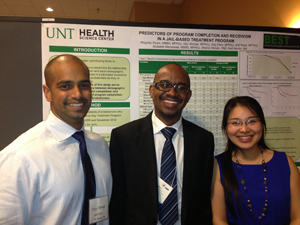MPH Epidemiology

Request Information / Admission Requirements / Application Deadlines / Apply Now!
Full-time Program: All students entering fall 2016 will progress through their program in a cohort, completing all degree requirements in five semesters (including summer).
The knowledge and skills of epidemiology and biostatistics are essential for many careers in public health, healthcare, and medicine. The joint epidemiology-biostatistics concentration is designed to prepare students who are committed to studying the distribution and determinants of diseases and other health-related conditions in both population and clinical settings, while simultaneously developing the methodological, analytical, and communication skills for research design, data analysis, and interpretation of results.
Alumni Spotlight

Kari Teigen, MPH, CPH
Maternal and Child Health Epidemiologist
Kansas Department of Health and Environment
By the conclusion of the MPH program, a student in biostatistics and epidemiology will be able to:
Biostatistics Competencies:
Foundation – Translate mathematical and statistical foundations to biostatistics;
Research Design – Design and critically evaluate study protocols in the health sciences;
Data Management – Design and apply comprehensive data management strategies for health-related studies;
Data Analysis – Identify and apply suitable statistical methods for data analyses;
Communication, Collaboration, and Consultation – Effectively communicate statistical information to health practitioners and professionals;
Ethical Practice – Understand and abide by strict ethical standards in health-related studies.
Epidemiology Competencies:
Descriptive Epidemiology – Describe a public health issue in terms of magnitude, person, time, place and ecological factors and lifespan considerations;
Evidence-Based Public Health – Identify and use sources of epidemiologic data, information, and knowledge as the basis for research and evidence based program and policy development;
Critical Analysis – Critically review epidemiologic studies, demonstrating understanding of sound research design, causality and the impact of confounding variables and bias;
Analytic Epidemiology – Demonstrate proficiency in epidemiologic study design, measurement and analysis, including the use of statistical software;
Epidemiologic Communication – Effectively communicate epidemiologic information in a linguistically and culturally appropriate manner to the general public, professionals, policy makers, across social sectors and in inter-professional communication;
Ethics – Comprehend basic ethical principles pertaining to the collection, maintenance, use and dissemination of epidemiologic data.
2016-2017 Curriculum
Core MPH Competencies (see below) / Course Descriptions / Sequence of Coursework
Core Courses (15 SCH)
BACH 5300 Theoretical Foundations of Individuals and Community Health (3 SCH)
BIOS 5301 Foundations of Biostatistics (3 SCH)
EOHS 5300 Environmental Determinants of Health (3 SCH)
EPID 5300 Principles of Epidemiology (3 SCH)
HMAP 5300 Introduction to Health Management and Policy (3 SCH)
Required Courses (34 SCH)
BIOS 5311 Regression and ANOVA (3 SCH)
BIOS 6300 Advanced Methods in Biostatistics (3 SCH)
BIOS 6314 Categorical Data Analysis (3 SCH)
BIOS 6320 Biostatistics Research and Consulting (3 SCH)
BIOS 6322 Longitudinal Data Analysis (3 SCH)
BIOS 6324 Survival Analysis (3 SCH)
EPID 5310 Intermediate Epidemiology (3 SCH)
EPID 5312 Survey Research & Questionnaire Design (3 SCH)
EPID 5313 Introduction to Data Management and Statistical Computing (3 SCH)
EPID 5314 Applied Data Analysis in Epidemiology (3 SCH)
EPID 5318 Chronic Disease Epidemiology* (3 SCH)
EPID 5320 Infectious Disease Epidemiology* (3 SCH)
*Students will choose between EPID 5318 or EPID 5320
PHED 5197 Professional and Academic Development (1 SCH)
Elective Courses (3 SCH)
BIOS 6312 Methods of Survey Sampling
BIOS 6326 Methods of Clinical Trials
Practice Experience (2 SCH)
BIOS 5297 Practice Experience in Public Health (2 SCH)
EPID 5297 Practice Experience in Public Health(2 SCH)
Students Choose between BIOS 5297 and EPID 5297
Culminating Experience
BIOS 5001 MPH Comprehensive Examination
EPID 5001 MPH Comprehensive Examination
PHED 5000 Certified in Public Health (SPH) Examination
CORE MPH COMPETENCIES
The Master of Public Health degree program prepares students to address the following core competencies while advancing their knowledge of public health:
Public Health Knowledge & Skills-The MPH student will apply basic knowledge and skills of the core public health sciences that include: biostatistics, epidemiology, health management and policy, behavioral and community health, and environmental and occupational health, to the prevention of illness and injury and the promotion of population health.
Integration of Theory and Practice-The MPH student will demonstrate the effective integration of theory and practice related to public health issues that affect diverse populations, through a thesis or comprehensive examination and a practice experience.
Communication and Informatics-The MPH student will gather, organize, and manage data and information effectively to address public health issues through oral and written communications to diverse professionals and lay audiences.
Diversity and Culture-The MPH student will demonstrate the ability to interact with both diverse individuals and communities to produce or impact an intended public health outcome.
Professionalism-The MPH student will apply ethical principles to the practice of public health in a variety of settings, demonstrating personal integrity while embracing diverse communities.


Social media